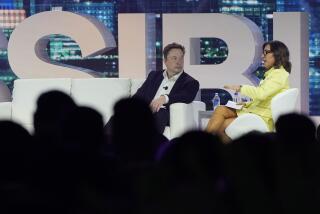Apple CEO to take leave for health
- Share via
LOS ANGELES AND SAN FRANCISCO — The decision by Apple Inc. boss Steve Jobs to take a medical leave after learning that his health issues were “more complex” than originally thought renews questions about the succession plan of a company whose fate has been closely linked to its charismatic leader.
On Wednesday, only a week after assuring investors that he felt fit to lead the Silicon Valley giant, Jobs wrote in an e-mail to employees that he would pass day-to-day management duties to Tim Cook, Apple’s chief operating officer, until the end of June.
Cook will reprise the role he played in 2004, when Jobs underwent surgery to remove a cancerous tumor from his pancreas.
“Steve Jobs is simply not going to be the force in the company that he has been in the past,” said Boston University management professor James Post. “What we are really seeing is another step taken toward the next generation of leadership at Apple.”
Jobs has not said whether his cancer has returned, only that he is suffering from a hormone imbalance that caused him to lose weight at an alarming rate.
Some investors questioned whether Apple had been forthcoming enough about the health of its chief executive -- a murky area of securities law.
The shares of the Cupertino, Calif., company tumbled more than 7% to $79.30 in after-hours trading Wednesday after the release of Jobs’ e-mail. They had fallen nearly 3% to $85.33 before the news.
Apple’s stock has been buffeted by rumors about Jobs’ health since he appeared gaunt at a developers conference in June. Gossip swirled anew last month, after Apple said he wouldn’t deliver the keynote address at the Macworld Conference & Expo for the first time in 11 years.
In an effort to quell the speculation, Jobs, 53, disclosed the hormone imbalance Jan. 5 and said he was working with doctors to correct it.
“I will be the first one to step up and tell our board of directors if I can no longer continue to fulfill my duties as Apple’s CEO,” Jobs said then.
But he said Wednesday that his health issues were “more complex” than thought and that curiosity over his condition continued to be a distraction, not only for him and his family but also for everyone at the company.
“In order to take myself out of the limelight and focus on my health, and to allow everyone at Apple to focus on delivering extraordinary products, I have decided to take a medical leave of absence,” Jobs wrote, adding that he planned to remain involved in strategic decisions during his absence.
Michael Obuchowski, managing director of First Empire Asset Management Inc., whose accounts hold Apple stock, said Wall Street had been wondering if it was getting the full story about Jobs’ health last week but was willing to give him the benefit of the doubt.
“Now, a few days later, he’s coming out with a cryptic statement,” Obuchowski said. “I think the amount of goodwill left right now among Apple’s investors is shrinking rapidly.”
Though he declined to discuss Apple specifically, a Securities and Exchange Commission spokesman said there was no explicit requirement that companies disclose their executives’ health problems. “But if a health issue is material, the company could have a disclosure obligation,” John Nester said.
There is no established legal precedent for the issue. “You can start a healthy debate among securities law practitioners on the topic of disclosure related to CEO health,” Stanford University law professor Joe Grundfest said.
Apple could face shareholder suits, Columbia University law professor John C. Coffee said. If the company’s stock falls sharply in response to Jobs’ medical leave, he said, attorneys will probably file suit, betting they can uncover pertinent false statements about Jobs’ health.
Coffee said Apple’s board may encounter increasing pressure to provide a succession plan, if only to convince investors that Apple could survive without Jobs.
Names frequently circulated as possible contenders for the top job include Cook; Jonathan Ive, a senior vice president who oversees the industrial design team; and Ron Johnson, senior vice president of retail.
Cook, 48, is more operations maestro than flashy impresario. But the Compaq Computer veteran, who joined Apple in 1998, is known for being as obsessive and demanding about Apple’s products as Jobs is.
He took over the sales force and customer support in 2000. While Jobs was recuperating from cancer surgery, Cook filled in and took over the Macintosh computer division. The following year, he became chief operating officer.
Following in Jobs’ footsteps would be no mean feat, and powerful CEOs rarely go willingly.
Marshall Goldsmith, author of the upcoming book “Succession: Are You Ready? (Memo to the CEO),” said the Apple co-founder had been cast as a heroic, visionary figure who rescued the company after he returned from a decade-long absence in 1997. That may put the company in the unenviable position of replacing a leader seen as irreplaceable.
“Now you’re seeing the negative side of what was earlier a positive story,” Goldsmith said.
--
--
No secrets, please
Jobs’ health is investors’ business, Michael Hiltzik writes. BUSINESS, C1






